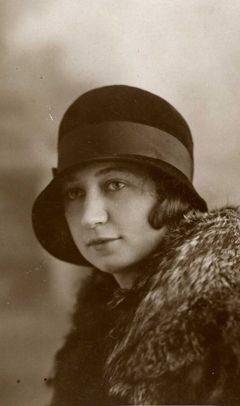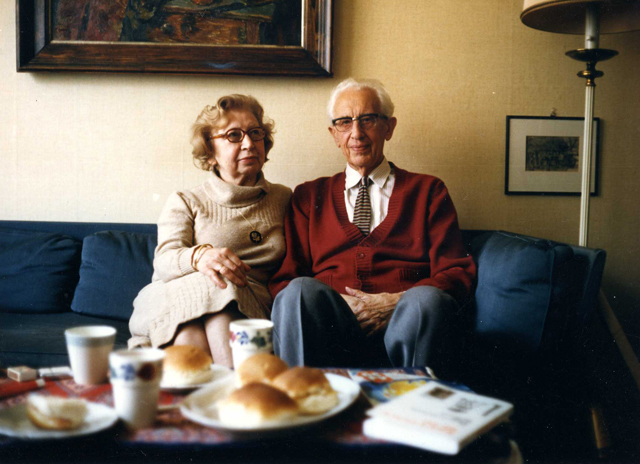'I was born in Vienna as Hermine Santruschitz (spelt later in the Netherlands as Santrouschitz), on February 15, 1909. My parents did not have the means to take proper care of me, so that was an unfortunate start. The lack of food as a result of the First World War meant that I became undernourished and was often ill. But in the autumn of 1920 I was suddenly presented the opportunity to spend three months in the Netherlands, together with other malnourished Austrian and Hungarian working class children, to regain strength with a foster family in Leiden. So that was a fortunate twist, I dare say. My foster parents, heeding the doctor's advice, then decided to make me part of their family permanently. With the situation in Austria remaining as it was, my parents realized that I would be better off in the Netherlands than I could ever be in Austria, so they agreed. Fortune again smiled on me, and then we moved from Leiden to Amsterdam, where I felt at home immediately.

Miep Gies, early 1930s.The 1930s were difficult years for those seeking jobs, but once again, luck was on my side. An upstairs neighbor told me that a certain company she knew had a temporary vacancy for office assistant. I went there and talked to the owner of the company, a German man from Frankfurt. His name was Otto Frank. Of course, there were several candidates for the job, but again I was fortunate: my native tongue was… German! So I got the job. And what's more, I was allowed to stay even after the sick employee that I was replacing recovered and returned to the office.
In 1938, my native country of Austria was annexed by Nazi Germany and renamed as Ost-Mark. Sad to say, many of my fellow countrymen supported this. On May 10, 1940, Germany invaded the Netherlands and after 5 days of bitter fighting, we were occupied. A problem arose when I wanted to get married in 1941: my passport had expired and if I didn't marry a Dutchman, I would have to return to Vienna. And even if I married a Dutchman, I had to prove my Aryan (or non-Jewish) descent, which could only be done in the town of my birth, Vienna. The Germans said that there was not enough time to satisfy all the formalities (I had refused to join a Nazi association of women and girls, and the Nazis had noted the fact), and I was deliberately hindered. If I hadn't had Uncle Anton in Vienna, who moved heaven and earth to obtain an approved proof of Aryan birth… but fate again smiled on me, everything worked out and on July 16, 1941, Jan Gies and I got married.
My husband became member of a resistance group that worked alongside the National Organization to assist hiders and that arranged all manner of things for people that wanted to go into hiding or already were. He never wanted to talk about it, but he must have saved scores of people. As for me, I got actively involved in the hiding of the families Frank and Van Pels and Dr. Pfeffer in the rear annex of our office at Prinsengracht; as did my husband, by the way. Following the betrayal on August 4, 1944, the annex was cleared out and a number of helpers were arrested. This was awful, since being arrested in connection with helping Jewish hiders meant deportation to a concentration camp and certain death. But then, in an incredible way, my luck turned again. The Nazi that was responsible for deporting the hiders and their helpers was named Karl Josef Silberbauer, an arrogant and yes, Austrian man from Vienna. And he just wasn't having his day, for while interrogating Otto Frank he discovered that Mr. Frank had fought for Germany in the First World War and that he held a higher army rank than himself. Silberbauer didn't quite salute him but he did offer to do everything calmly.

October 1945, Otto Frank seated in the middle with Miep Gies and Johannes Kleiman on the left, and Bep Voskuijl and Victor Kugler on the right.Then it was my turn. The Austrian barked at me: 'Schämen Sie sich nicht, Judenbagage zu helfen?'('Are you not ashamed of yourself for helping Jews?') I said that I came from Vienna, just like he. Silberbauer hesitated and stomped through the room. Finally he decided that I was allowed to stay in the office. 'Aus persönlicher Sympatie'('Out of personal sympathy'), he said. But he added that he would be coming back and warned me that fleeing was not an option. My colleague Bep Voskuijl was also allowed to stay. That was not the case for the helpers Johannes Kleinman and Victor Kugler, however. They were deported along with the eight hiders. After some time (I was afraid that the Nazis would come back), either later that same day or the next day, I can't quite remember, I entered the Secret Annex with Bep and stockroom manager Van Maaren. There we gathered together all the loose papers and books belonging to Anne. Without reading them we stored them in the drawer of my desk, thinking we could give everything back to Anne after the war.
The craziest plan that we came up with after the raid on the Annex was that I, after collecting money from everyone in the company, would go to the headquarters of the Sicherheitsdienst (Security Service)to bribe the Nazis into releasing the hiders and helpers. With wobbly knees, I made my way there.
In the building of the SD I met the Austrian that had supervised the arrests in the Annex, and he told me to go upstairs. On the landing I saw a door half open, and I entered. In a bare room stood a table with a radio, and around it stood a group of high-ranking Nazi soldiers. The voice that came from the radio was English; they were listening to the BBC! I should probably have been arrested right away, but they were too astonished to react, and I fled from the building as fast as I could. The plan had failed, but my personal lucky charm (I had left the SD headquarters unharmed) had not deserted me.
In the spring of 1945 the war was finally over, and the waiting began for those who would return from the concentration camps. Of the eight hiders in the Secret Annex, only Otto Frank returned. As soon as it became clear that Anne had perished, I gave her father all her papers with the words, 'This is the legacy of your daughter Anne'.
The rest of the story is well-known. My husband kept silent about his noble deeds, and Anne became after her death what she had wanted to become in life: a famous writer. I considered it a tremendous honor, in later years, to represent Anne in speaking at schools and fully packed auditoriums, all over the world.
Looking back at my life it seems that fortune, for ever perched on my shoulder, is the red thread that runs throughout. I am fully justified in saying: this is the way things were meant to be for me, I have had all the luck in the world. Perhaps I was guided, I do not know, but I am anyhow very grateful.'
Miep Gies
Click here to see some video excerpts in which Miep Gies recounts the days when the family Frank was in hiding.

Miep and Jan Gies at home in Amsterdam, ca. 1986-1988.


